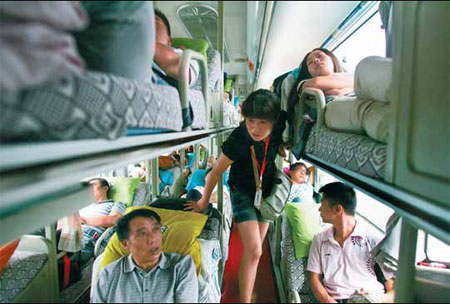IN BRIEF (Page 2)

| A bus company staff member explains safety rules to passengers at Sanfuwan bus terminal in Xi'an, capital of Shaanxi province. Ma Jiewen / for China Daily |
Safety
Sleeper buses on way out
The sleeper bus, a unique means of public transportation in China, may disappear from the roads in five or six years, and restrictions on its use are being considered to prevent more accidents, a senior official said.
In the early hours of Aug 26, 36 people in a sleeper bus were killed when it caught fire after ramming into a tanker carrying methanol, a highly flammable liquid, on a highway in Shaanxi province.
The government halted the manufacture of sleeper buses on March 1, and work safety authorities will take measures to ensure manufacturers follow the order, said Zhu Yichang, deputy director of the policy and regulation department of the State Administration of Work Safety.
Industry insiders estimate that with the production halt, about 60,000 buses may disappear from the roads in five or six years - the end of their service life.
Economy
Slowdown hits key export hub
An increasing number of companies in Wenzhou, a key manufacturing and export region, have gone out of business amid difficulties that are "more serious" than the 2008 financial crisis, an industry leader said.
The alert came as Premier Wen Jiabao warned last week that the economy still faces downward pressure.
Wenzhou, in Zhejiang province, is often referred to as a hub of small- and medium-sized enterprises. But it has witnessed a rise in bankruptcies that is even more serious than the 2008-09 financial crisis, said Zhou Dewen, chairman of the Wenzhou SME Development Association.
According to a report released by the financial and economic committee of the Zhejiang Provincial People's Congress, 140 out of 3,998 large enterprises in Wenzhou closed in the first half of the year, while 57 percent of those large companies cut production.
Transport
Car plate applicants exceed 1m
On Aug 26, a record 1-million-plus people in Beijing entered a lottery for fewer than 20,000 registration certificates that would allow them to buy cars.
With a fixed number of car registrations issued each month and a lengthening waiting list, many potential car buyers are losing hope.
Some 1.05 million qualified applicants entered the registration lottery in August - 110,000 of them for the first time - but only 19,926 registrations will be issued, the city office in charge of the lottery system said on Aug 25.
One in every 53 applicants will get the registrations, 80 percent fewer than in January last year, when Beijing introduced the lottery system to cap new car ownerships at 240,000 a year.
Tourism
Draft law to ensure tourists' rights
A draft law on tourism, targeting unscrupulous practices by travel agents and clearly stating the rights of travelers, is being reviewed by lawmakers. If passed, it will be the first legislation covering the industry.
"There is an urgent need for this law to promote the healthy and sustainable development of tourism," Yin Zhongqing, deputy director of the financial and economic affairs committee of the National People's Congress, said on Aug 27. The congress is China's top legislature.
The draft sets operating standards for travel businesses and scenic areas, and prohibits travel agencies from forcing tourists to buy goods. Tipping will be at the discretion of the tourist, it says.
Education
Classes on entrepreneurship
Universities have been ordered to start teaching basic courses on entrepreneurship to undergraduates to encourage students to start businesses and become self-employed after they graduate.
According to Entrepreneurship Foundations, the draft teaching plan issued by the Ministry of Education, the course requires no less than two credit units and 32 hours of classes. The goal of the course is to establish a positive awareness of entrepreneurship, the ministry said.
Instead of starting businesses after college, most Chinese graduates look for employment opportunities.
There were 6.6 million college graduates nationwide in 2011. However, only 1.6 percent of graduates started businesses.
Call for more international schools
Shanghai wants to attract more international education companies to the city to meet the needs of the rising number of foreign residents, city officials said.
Shanghai currently has 32 international schools for foreign children, in which more than 24,000 students are enrolled, according to the Shanghai Municipal Education Commission.
Most of these schools are located in the Pudong and Minhang districts. In the future the layout of international schools will be adjusted. More schools will be opened in other districts to meet the rising demand, said Yang Weiren, an official from the commission's international exchange and cooperation department.
China Daily
(China Daily 08/31/2012 page2)
Today's Top News
- Experts share ideas on advancing human rights
- Japan PM's remarks on Taiwan send severely wrong signal
- Key steps to boost RMB's intl standing highlighted
- Sustained fight against corruption urged
- Xi calls for promotion of spirit of volunteerism
- Xi calls for promoting volunteer spirit to serve national rejuvenation































